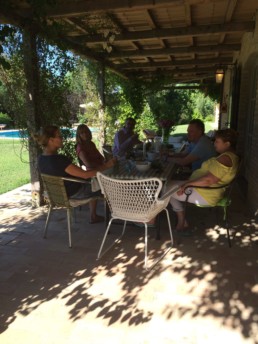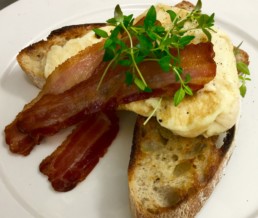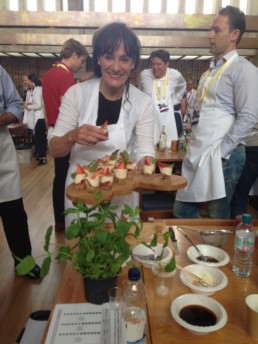Is there a future for independent food retailers?
Food Matters Live
ExCel 18th November 2015
Is the independent food and drink scene here to stay?
I am Tine Roche and I am the founder of Cambridge Cookery School & Café. I am a Scandinavian born chef and although I have spent more years in the UK than in my native Denmark and Sweden, my view on food and my approach to cooking is strongly influenced by my Nordic heritage. My business partner Liz is an Aucklander who worked as a chef in Sydney before embarking on cooking her way around the globe as a private chef on some of the world’s largest yachts. Consequently, we share a global, rather than a British, outlook on food and café culture.
I was asked to step in to delivery this presentation only last week. The setting for the meeting I had with Vhari Russel, one of the two founders of award winning GrubClub, a local network for people in the food business in Cambridge, is, I think, relevant. Vhari was a guest on one of my culinary food tours to Italy. I specialise in tailor made, high quality gourmet trips to Stockholm, which is an amazing food city with a world leading culinary scene and Le Marche in Italy, which is recognised by most Italians as one of the country’s top food regions but still remains largely unknown by people outside Italy. October and November are the months when we go to Stockholm to eat in trend setting restaurants a such as Ekstedt, and go into the vast forests to forage for wild mushrooms, bake traditional flat breads and generally dip under the surface of what most visitors would discover on a trip to the Swedish capital.
Our trips to Le Marche coincide with the truffle season – not least as Le Marche is one of the few areas in the world where white truffles grow – and we go truffle hunting with a man and his dog, I join in as a guest chef at the local truffle festival and we visit small, independent food and wine purveyors which I have gathered around me to ensure a unique, off the beaten track experience.
As I said, Vhari was one of our guests when she was told that the previous speaker was unable to attend and we sat down to talk between having had the most amazing hand made pastries and coffee – less than €3 for 2 – and lunch consisting of the local Piadini bread filled with fresh rocket and regional mountain ham – NOT Parma ham, of course, as that is produced miles away and Le Marche makes its own superb air dried ham, thank you very much. Our guests who travel with us on our hands on cookery holidays and slow food trips, naturally all share an interest in the genuine and the local.
Italy is an antidote to a world saturated by big food brands dominating a global commodity market ensuring constant supply chains and resulting in a complete disconnect between the local and seasonal and what is on our table. Or, to phrase it a little more bluntly, between the here and now and what we feed our families.
Food in Italy is still deeply rooted in local tradition. Each region is passionately loyal to its regional produce and dishes and the wine enjoyed with the food is also so local that it often comes from a 20-mile radius of where it is consumed. Supermarkets sell only what is in season – as I have learnt on several occasions when I have cooked with guests in Italy and have set out in search of say fresh raspberries or a certain herb, only to be reminded that of course they are not available as they are not in season or not grown in that part of Italy. This can at times seem restrictive to those of us who are used to shopping at the big supermarkets where all the fresh produce of the world is available 365 days a year. Asparagus in November – no problem, here are some flown in from Mexico. Black cherries to go in a fruit cake for Christmas – here are some from South Africa or Argentina. We get our inspiration from TV chefs – professional and rising amateurs alike. The everyday activity of feeding ourselves and our families has been turned into entertainment focused on speed, competition, novelty and that all-important wow-factor.
The term “food porn” usually describes, I think, a wish to gorge on visual images to sate an appetite. I would go further and say that the reference to porn is accurate also from the point of view that food in the media, whether in print or on television, is projecting a completely false image of what daily food is, and more importantly should be. It removes the user of the “porn”, if you will allow me to continue to use that phrase for a little longer, from real life and replaces it with voyeurism, totally unrealistic expectations and ultimately a feeling of disconnect and disappointment when one’s real life doesn’t live to expectations of the outstanding and the extraordinary. A meal after a long day at work on a dark Tuesday night in November can’t – and shouldn’t – be taken from a glossy recipe based on the latest food trends and eaten cold as a result of having been first arranged, lit, photographed, edited and sent out on social media before we sit down and eat it.
It should be “Italian” and by that I mean consist of a few local and seasonal ingredients – cabbage, root vegetables, perhaps a bit of stale bread and cheese left over from the weekend – which to me spells “delicious winter soup”. Not only would it cost pennies per portion and taste divine, but it would show our children how to cook sensibly and passionately whilst supporting local farmers and producers.
So, forgive me this circumspect route to reach the subject of this talk, do I believe there is a place for independent food retailers in the UK. Yes, of course I do and fortunately I am not alone.
Last year more than 40,000 British independent retailers were registered and there was a 27 per cent increase in food and drink merchants year-on-year. These include a 31 per cent rise in bakeries and a 10 per cent increase in wine merchants.
There has also been an astonishing 65 per cent rise in independent supermarkets, which includes small delis and grocers, but not chain supermarkets or brands like Londis or The Co-op. This is music to my ears as someone with a previous life as a fact and trend finder for large food brands during the late 1990’s and early 2000s, when Tesco conquered the global market like some latter day Roman army whose rise seemed unstoppable.
Obviously, this is all good news and whilst I expressed criticism of the way we have swapped real life cooking for micro wave meals in front of the food programs on TV, the past decade of watching Delia, Nigella and Jamie and being hooked on the Great British Bake Off, has resulted in turning our food at home into a point of conversation – where it is sourced, how it was cooked and what is it matched with. We are becoming more inquisitive and well informed about what we put in our body, not only from an health perspective but also from an ethical one. This – and the economic down turn of recent years – has had the positive effect of people taking matters into their own hands not only as consumers of food but also by starting food stalls, pop-ups and supper clubs. And finally – my antipodean business partner Liz would say not a day too soon – the UK sees an increased interest in quality coffee and after a decade of corporate coffee brands it is becoming harder to find a coffee shop selling burnt milk coffees in a 20oz cups.
My own path to becoming an owner of an independent food business started back in 2005 which was just before our national obsession with food took off. Stumbling upon a lovely outdoor corporate food event in San Fransisco whilst on tour with a large Scandinavian bread producer, the seed was sown in my head for starting up a cookery school catering for both private individuals, youngsters and corporate guests, whilst also supporting the local community through links to schools and charities. I started Cambridge Cookery School in 2008 – gingerly – with classes around my own kitchen table and found the old warehouse where I built the kitchen a year later and created what was our beautiful home until this September when we expanded and moved into a larger space where we have recreated our award winning teaching kitchen but also opened a brand new café. The look is very much in line with my Scandinavian background – light and airy, clean, contemporary and creating a neutral back drop for our stunning table ware. We have a wonderful sponsorship from iittala – a cult brand of glass and china table-ware whose mission is to create essential objects that are made to enrich people’s everyday lives and whose motto is not simply to create beautiful objects but timeless design that will never be thrown away.
That quality ethos reflects our own attitude to food. We are building up a network of very local, small growers of seasonal produce. One such supplier is in his 80s and has a large allotment on which he has grown vegetables for over 40 years and what he does not know about sustainable, pesticide-free small scale farming is not worth knowing. Working with Robin means that we are cooking with vegetables which have been organically grown less than 1km from our kitchen and it helps us source first and design the menu second, to reflect what is in season, rather than the other way around. We bake our own Scandinavian rye breads and make Croissants from scratch and will soon start to sell our sour dough loaves and ryes in the café – something which many of our guests have requested. Our menu changes daily – when our Japanese colleague is in the salads are inspired by her food heritage – and the idea of offering healthy, sustainable, beautiful and delicious food has definitely been warmly welcomed by our visitors. We will not sell masses of imported jars and tins of food simply to make the shelves look good. We are focusing on quality rather than quantity and on being true to our little part of East Anglia and to the seasons. Our only concession to more far flung produce will be through a link to our beloved Le Marche, where we work with a small producer of pasta, olive oil and wine whose products we will import and sell to create a link to a region where local, seasonal and traditional are key.
To sum up, the trend has turned away from big super markets and weekly shops driven by a quest for the lowest price without any concern for the hidden and much higher price paid firstly by animals and secondly by farmers and the soil itself, and ultimately by all of us, in a commodity driven, global food chain. People are much more aware of health and animal welfare and one of the most welcome trends for me is the move away from a daily diet of animal protein. It does not take being a vegetarian or vegan to see what the cost is to animals and to the earth of high intensity animal farming and it is great to see chefs all over Europe displaying a passion for plant based cooking. Bruno Loubet was met with a wall of disbelief, even some ridicule, when he first announced plans for a largely plant based menu at The Grain Store – and look at the success of it now.
The past 10 years were dominated by price and I think the next decade will focus on quality and sustainability.
Consumers will seek quality not only in what they eat and shop, but also in the experience itself. From the global to the local is the other big trend I see – people want a local café or bakery or deli where they feel sure they can trust the quality of food and drink, where the people who run the business engage in dialogue and where you can take your kids, read the paper and meet neighbours and friends. In short, a place which is an extension of your life at home.
Le Marche culinary trips
July 30, 2016
In defence of Food
July 23, 2016
A Food Safari for 150 at Churchill college
July 17, 2015
Joining Simply Good Food TV
June 20, 2015



